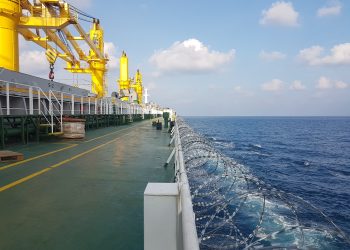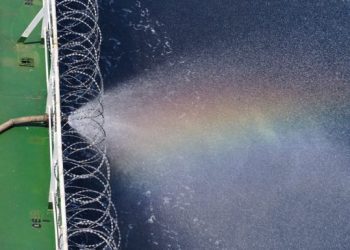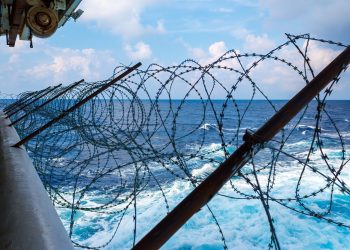Let your Yacht take the ferry
 Let your Yacht take the ferry – when considering a passage through the Gulf of Aden, Arabian Sea and western Indian Ocean, north of 10 degrees south and west of 78 degrees east.
Let your Yacht take the ferry – when considering a passage through the Gulf of Aden, Arabian Sea and western Indian Ocean, north of 10 degrees south and west of 78 degrees east.
Somali pirates operating in this area are looking for merchant ships, yet the past has shown that pirates will attack large and even smaller yachts passing their way. Larger yachts with more people onboard or a group of yachts could be seen as a valuable and easy target for the pirates.
The risk is higher than ever
Successful disruptions by naval forces over the past few months, complemented by merchant ships masters’ adherence and implementation of advice in Best Management Practices, have significantly reduced the pirates’ ability to capture merchant vessels. However pirates still constitute a considerable threat. Being less successful in hijackings of merchant ships they will continue to develop new operational tactics, which could include yachts.
A sum-up of facts
– the number of attacks remains as high as ever,
– pirates are less successful in hijackings of merchant ships,
– a yacht or a group of yachts are an easy target,
– the pirates have shown both willingness and ability to attack even smaller yachts.
This should lead to the conclusion that transiting the high risk area in a yacht is more dangerous than ever.
A sitting duck
When pirates attack a yacht, the normal goal will be hostages. Nevertheless, if they spot a yacht, valuables can be taken easily from a yacht on their way to larger prey. Somali pirates are capable of operating in excess of 1200nm from the Somali Coast with the use of “motherships”. As pirates are often short on supplies and replenishment is easily achievable by boarding a passing yacht, or they use the yacht as transport to get ashore. There is even the possibility that the pirates may use the yacht to try stop a merchant ship. They may try to convince the merchant ship that it is a yacht in distress. As a supplement, “amateur pirates” operating in the Gulf of Aden occupied by smuggling or other crimes, are often willing to commit piracy whenever there is a possible target.
With both a low freeboard and low speed yachts are especially vulnerable to pirate attacks. Merchant ships use Ship Protection Measures noted in Best Management Practices to win time for naval forces to assist. Due to the speed of an attack against a yacht, the coalition counter-piracy forces do not have the time to render assistance to a yacht before pirates are able to get onboard. With the right implementation of Best Management Practices, including a citadel, a merchant ship crew can resist pirates for hours, even days. A yacht may be able to resist a skiff for a few minutes from the time the skiff is originally spotted on the horizon.The area affected by piracy consists of more than 2.6 million square miles.
There are a limited number of war ships to cover this area, which is larger than Europe. Even if there is a warship equipped with helicopter in the vicinity, a yacht would be very lucky if a helicopter would be able to assist.
Do not make an irresponsible decision just to save money for alternative transport of your yacht
It is highly irresponsible to sail a yacht through the Gulf of Aden, Arabian Sea and the Western Indian Ocean. There are alternatives.
If it is impossible to take another route, book transport for your yacht through the High Risk Area aboard a merchant ship. There are specialist transport companies available to provide this type of service, and some more regular shipping companies will often offer the same, or a similar service.
Convoying yachts is not protection
A group of yachts forming a convoy is not protection in itself. Unlike other criminals, the Somali pirates go for ransom and not the yacht itself. A larger group of yachts provides a larger target the possibility for the pirates to capture many hostages before eventual naval assistance could possibly reach their position. The use of firearms to protect the convoy will not scare the pirates away. Pirates have fought back, even when approached by war ships. If the convoy fires weapons, the pirates answer is likely to be superior and potentially devastating. The pirates have no limits, and they have shown a ruthless disregard for human lives.
Facing years in harsh conditions
Generally, yachts are held by pirates considerably longer than merchant ships. The average time a merchant ship is held is more than 6 months, on average. As yacht crews don’t hold piracy insurance, therefore a yacht would not have support from an insurance company with professional negotiators. For sailors with no backup from an insurance company, the family and the local community have to gather enough money, which on some occasions has taken years. Somali Pirates are unpredictable because they are influenced by khat and other stimulants, often treating victims with extreme violence. The victims are kept in cruel conditions ashore in Somalia, while the pirates sometimes use torture to influence the hostage’s family back home.
Report any intended passage through the High Risk Area
A final decision on whether to enter to any waters where pirates are known to operate and how to conduct a vessel in those waters remains entirely the responsibility of the captain of each vessel. Nevertheless, it is highly irresponsible to sail a yacht through pirate infested waters. Do not make this decision just to save money on alternative transport of the yacht – the cost could be too unthinkable to bear.
Any yachts in the area that do not pay attention to this advice, and choose to sail these water despite this advice, should inform Maritime Security Centre Horn of Africa (MSCHOA) at [email protected] with the subject line “Yacht Vessel Movement” and read the guidance on the Maritime Security Centre Horn of Africa homepage www.mschoa.org, or on the NATO Shipping Centre homepage www.shipping.nato.int.
A yacht that does not report to naval authorities will be unknown to them and is unlikely to receive any assistance even though it may have been possible. Read the full advice provided by ISAF in the guidance “Consolidated Guidance Notice to Yachts. Piracy in Gulf of Aden”, found on the ISAF website:
INTERNATIONAL SAILING FEDERATION – ISAF http://www.sailing.org
Source: NATO





























































